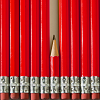Skip over navigation
Some definitions
random:
A term used in probability, relating to things that happen by chance. It means that there is no special pattern to the items or numbers that are selected or chosen, that is, they happen in a haphazard way.
random experiment:
Some process that is carried out according to a set of rules. The rules determine completely the process that we carry out, but they do not tell us in advance what the outcome of the experiment will be. A random experiment can be repeated arbitrarily often.
random number:
A sequence of randomly generated numbers, where all the numbers had an equal chance of being picked, every time. Tables of random numbers used to be printed in books, these days they're usually simulated on computers/calculators. They are used to select random samples in statistics.


Or search by topic
Number and algebra
Geometry and measure
Probability and statistics
Working mathematically
Advanced mathematics
For younger learners
Misunderstanding Randomness
Age 11 to 14
Challenge Level 





- Problem
- Getting Started
- Student Solutions
- Teachers' Resources
Some definitions
random:
A term used in probability, relating to things that happen by chance. It means that there is no special pattern to the items or numbers that are selected or chosen, that is, they happen in a haphazard way.
random experiment:
Some process that is carried out according to a set of rules. The rules determine completely the process that we carry out, but they do not tell us in advance what the outcome of the experiment will be. A random experiment can be repeated arbitrarily often.
random number:
A sequence of randomly generated numbers, where all the numbers had an equal chance of being picked, every time. Tables of random numbers used to be printed in books, these days they're usually simulated on computers/calculators. They are used to select random samples in statistics.
You may also like
Master Minding
Your partner chooses two beads and places them side by side behind a screen. What is the minimum number of guesses you would need to be sure of guessing the two beads and their positions?
Racing Odds
In a race the odds are: 2 to 1 against the rhinoceros winning and 3 to 2 against the hippopotamus winning. What are the odds against the elephant winning if the race is fair?


